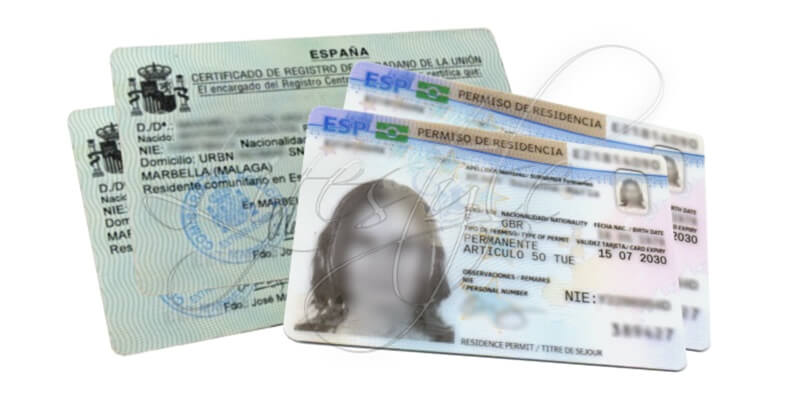What is the Difference between NIE and TIE?
In Spain, non-European Union citizens are assigned a unique identification number called NIE and a physical residence card known as TIE. While both serve to identify non-EU nationals in the country, there are important differences between the two. In this article, we will explore the distinctions between NIE and TIE and their respective purposes in the Spanish immigration system.

1. NIE stands for Número de Identificación de Extranjero
The NIE, which stands for Número de Identificación Extranjero, is an identification number that is assigned to foreigners by the Spanish government. This unique and permanent number is used for various official purposes, such as tax declarations, buying real estate, opening a bank account and getting a Spanish mortgage. It is important to note that the NIE is not a substitute for a residency permit or a work visa, but rather an essential fiscal identification number for foreigners residing in Spain, whether temporarily or permanently.
Upon obtaining the NIE, non-EU nationals may also need to apply for a TIE, especially if they plan to stay in Spain for an extended period. TIE, which stands for Tarjeta de Identidad de Extranjeros, is the physical card that contains the holder’s identification data, photograph, and the type of authorization to stay in the country. This card is issued to non-EU nationals by the Spanish authorities and serves as proof of legal residency in Spain. It is important to highlight that the TIE is not a substitute for the NIE but rather a complement, as it is the physical document that validates a non-EU national’s legal presence in the country.
Furthermore, the NIE is typically obtained before the TIE, as it is a fundamental requirement for non-EU nationals who need to carry out financial or legal transactions in Spain, such as purchasing a property or applying for a mortgage in Spain.
2. Getting your NIE
While you can apply for the NIE at a Spanish consulate in your home country, this is often a very lengthy process as appointments at consulates are very hard to come by. As a result, Hipoteken recommend you apply for the NIE while in Spain and contract the services of a local solicitor to do so. A local solicitor will not only get you an appointment with the Spanish authorities much quicker, but will also help you understand the whole process, obtain the documentation required and can even represent you at the appointment via a Power of Attorney, which would save you the cost of having to travel to Spain to be present at the appointment if the date does not coincide with your stay.
A local solicitor is also invaluable when it comes to purchasing a property in Spain, carrying out due diligence on the property to ensure it meets all the necessary legal requirements and obtaining documentation required to apply for a mortgage, as well as acting as a liaison between you, your real estate agent, the sellers of the property and your bank, overcoming the language barrier.
3. TIE stands for Tarjeta de Identidad de Extranjeros
As an essential document for non-EU nationals residing in Spain, the Tarjeta de Identidad de Extranjeros (TIE) plays a crucial role in establishing and proving legal residency in the country. Unlike the Número de Identificación de Extranjero (NIE), which is a unique and permanent identification number, the TIE is a physical card that contains the holder’s personal information, photograph, and the specific type of authorization for staying in Spain. This distinction is important, as the TIE serves as the official document of legal residency for non-EU nationals, providing access to various rights and services within the country.
When comparing the NIE and the TIE, it is essential to recognize that the TIE holds a different status and function. While the NIE is primarily used for administrative and financial purposes, the TIE is the primary document that proves a non-EU national’s legal right to reside in Spain. It is commonly required for activities such as employment, obtaining health care, and accessing public services. The TIE also contains specific information about the holder’s authorization to stay in the country, making it an indispensable item for individuals who are not citizens of the European Union and are residing in Spain for an extended period.
Obtaining the TIE is often a crucial step for non-EU nationals who plan to reside in Spain for an extended period, whether for work, study, or family reasons. The process for obtaining the TIE typically involves specific documentation, proof of residence, and, in some cases, a scheduled appointment at the relevant immigration office or police station. Once again, Hipoteken strongly recommend you hire the services of a local solicitor to help you navigate this process. Just ask Hipoteken and we can recommend English-speaking solicitors to help you.
It is important to note that the TIE is directly linked to the holder’s residence permit, and its expiry date may coincide with the renewal period for the permit. As a result, individuals holding a TIE must ensure that they renew it in a timely manner to maintain their legal residency status in Spain.
For non-EU nationals, the TIE is a critical document that goes beyond a mere identification number, as it provides tangible proof of legal residency and facilitates their integration into various aspects of life in Spain. Whether it is to secure employment, access healthcare services, or engage in official transactions, the TIE is an essential requirement. Understanding the distinction between the NIE and the TIE, as well as the specific applications and significance of each, is fundamental for non-EU nationals navigating the legal and administrative requirements of residing in Spain for an extended period.

4. Differences between NIE and TIE
When considering the differences between the Número de Identificación de Extranjero (NIE) and the Tarjeta de Identidad de Extranjeros (TIE), it is important to emphasize that each serves a distinct purpose in the legal and administrative framework for non-EU nationals in Spain. The NIE, as an identification number, is crucial for various official transactions and declarations, such as filing tax returns, property purchases and financial operations. It is a unique and permanent number that is essential for all non-EU nationals, regardless of the type of residency or authorization to stay in the country. On the other hand, the TIE, as a physical residency card, is directly linked to a non-EU national’s legal right to reside in Spain and is a prerequisite for activities such as employment, accessing public services, and proving legal residency status.
Furthermore, while the NIE remains a constant and unchanging number, the TIE has an expiry date and must be renewed in accordance with the validity of the holder’s residence permit. This distinction is crucial, as TIE expiry can directly impact a non-EU national’s legal residency status in Spain, making it imperative to adhere to the renewal requirements and timelines. In contrast, the NIE does not have an expiry date and remains the same for the individual’s lifetime, serving as a permanent identification number for official and administrative use.
Understanding the differences between the NIE and TIE is vital for every non-EU national residing in Spain or planning to do so, as it directly impacts their ability to engage in various activities and access essential services in the country. From financial transactions to employment opportunities and healthcare access, the NIE and TIE play distinct yet interconnected roles in establishing and maintaining a non-EU national’s legal presence in Spain. By comprehending the specific functions and significance of the NIE and TIE, individuals can navigate the administrative and legal requirements of living in Spain with greater clarity and compliance.
Conclusion
In conclusion, while both NIE and TIE serve as identification numbers for foreigners in Spain, there are significant differences between the two. While NIE is a unique and permanent number with no legal value, TIE is a physical card that serves as proof of legal residence and must be renewed according to the residence permit. Understanding these differences is essential for foreigners living in Spain.
Got any questions about pre-approved mortgages?
Don’t hesitate to contact Hipoteken for a no-obligation chat with one of our experienced specialists on our Contact page.

